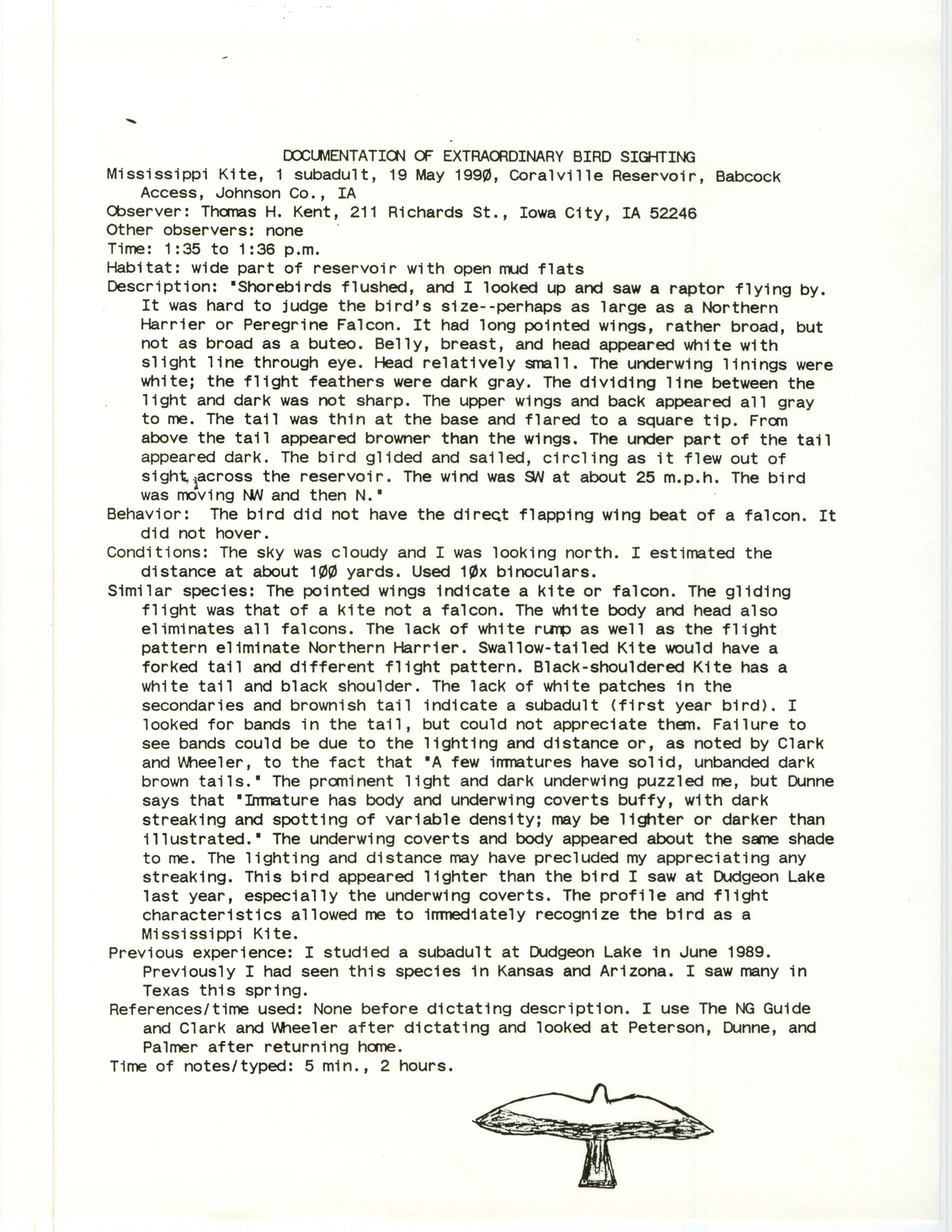| UID |
|
| Digital Object Type |
Rare birds documentation form |
| Content DM Link |
https://n2t.net/ark:/87292/w9p843z12 |
| Type |
Text |
| Description |
Rare bird documentation form for a Mississippi Kite at Coralville Reservoir in Johnson County, IA on May 19, 1990. |
| Related Genres |
Field notes |
| Sort Date |
1990-05-19 |
| People / Organizations |
|
| Time |
1:35 PM |
| Rights |
This Item is protected by copyright and/or related rights. However, for this Item, either (a) no rights-holder(s) have been identified or (b) one or more rights-holder(s) have been identified but none have been located. If you have any information that can contribute to identifying or locating the rights-holder(s) please notify the Iowa State University Library Digital Initiatives Program (digital@iastate.edu). (Rightsstatements.org InC-RUU 1.0). The original object is available at the Iowa State University Library Special Collections and University Archives (archives@iastate.edu). |
| Data Access Rights |
http://vertnet.org/resources/norms.html |
| Data License |
http://creativecommons.org/publicdomain/zero/1.0 |
| Collection |
Iowa Ornithologists' Union | MS 166 |
| Box |
33 |
| Folder |
20 |
| Contributing Institution |
Iowa State University Library Special Collections and University Archives |
| Creator / Author |
Kent, Thomas H. (Thomas Hugh), 1934- |
| Contributors |
|
| Topics |
Birds--Identification Ornithology Rare birds |
| Birds |
Mississippi Kite |
| Locations |
Coralville Lake |
| Map |
|
| Verbatim Locality |
Coralville Reservoir, Babcock Access, Johnson Co., IA |
| Location Remarks |
The documentation forms do not include georeferences |
| Habitat |
wide part of reservoir with open mud flats |
| Extent |
1 page |
| Language(s) |
eng |
| Bibliographic Citation |
|
| Information Withheld |
|
| Individual Count |
1 |
| Occurrence Remarks |
The documentation form by Thomas H. Kent is the only one submitted and forms the basis of this record. | Elimination of similar species: The pointed wings indicate a kite or falcon. The gliding flight was that of a kite not a falcon. The white body and head also eliminates all falcons. The lack of white rump as well as the flight pattern eliminate Northern Harrier. Swallow-tailed Kite would have a forked tail and different flight pattern. Black-shouldered Kite has a white tail and black shoulder. The lack of white patches in the secondaries and brownish tail indicate a subadult (first year bird). I looked for bands in the tail but could not appreciate them. Failure to see bands could be due to the lighting and distance or, as noted by Clark and Wheeler, to the fact that "A few immatures have solid, unbanded dark brown tails." The prominent light and dark underwing puzzled me, but Dunne says "Immature has body and underwing coverts buffy, with dark streaking and spotting of variable density; may be lighter or darker than illustrated." The underwing coverts and body appeared about the same shade to me. The lighting and distance may have precluded my appreciating any streaking. This bird appeared lighter than the bird I saw at Dudgeon Lake last year, especially the underwing coverts. The profile and flight characteristics allowed me to immediately recognize the bird as a Mississippi Kite. | The original documentation form event lasted from 13:35:00/13:36:00. |
| Occurrence Status |
present |
| Field Number |
|
| Event Remarks |
Viewing Conditions: The sky was cloudy and I was looking north. I estimated the distance at about 100 yards. Used 10x binoculars. |
| Supporting Documentation |
National Geographic Society. National geographic field guide to the birds of North America. Washington D.C.: National Geographic Society. | Clark W and Wheeler BK. A Field Guide to Hawks of North America. New York: Houghton Mifflin Harcourt. | Dunne P. Pete. Dunne's essential field guide companion: a comprehensive resource for identifying North American birds. New York: Houghton Mifflin Harcourt. | Palmer RS. Handbook of North American birds. New Haven (CT): Yale University Press. | Peterson, RT. Peterson field guide to birds of North America. New York: Houghton Mifflin Harcourt. |
| Date Digital |
01 Dec 2017 |
| File Type |
image/jpeg |
| Hardware / Software |
Epson - sheet feed |
